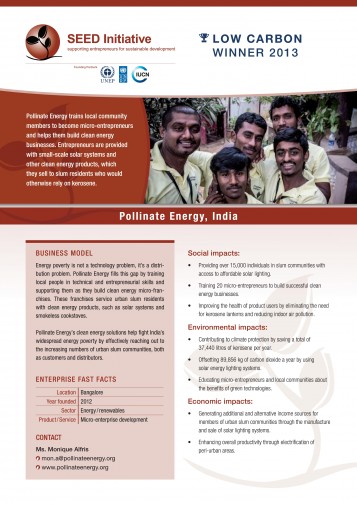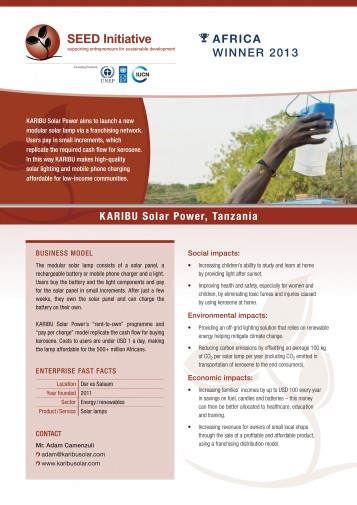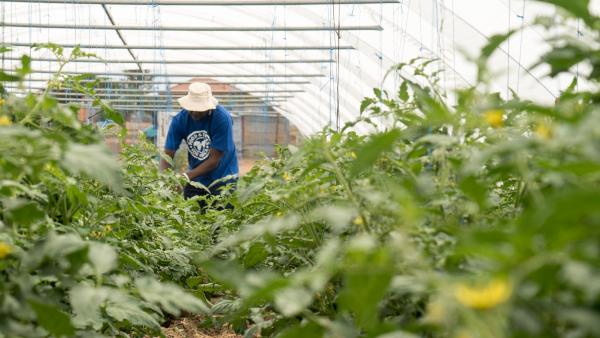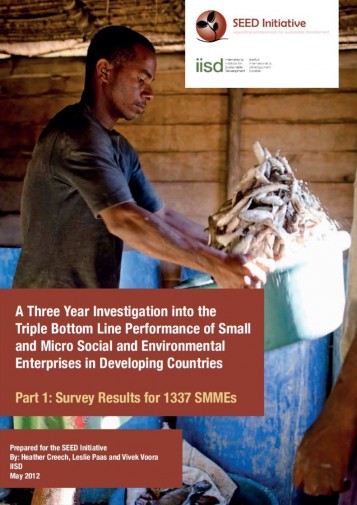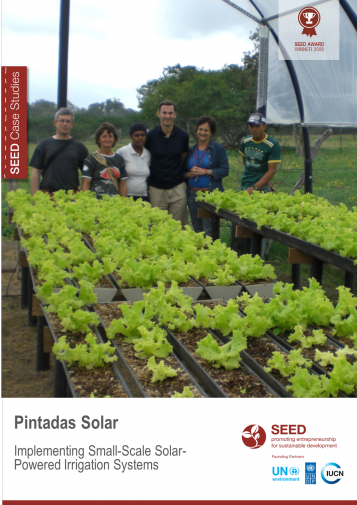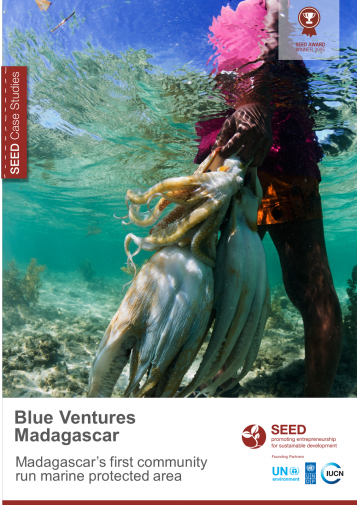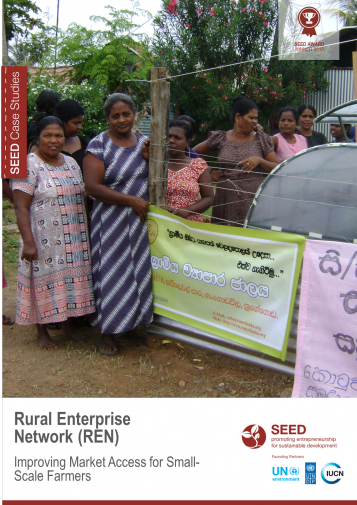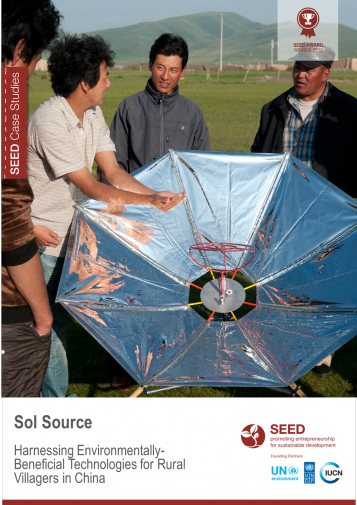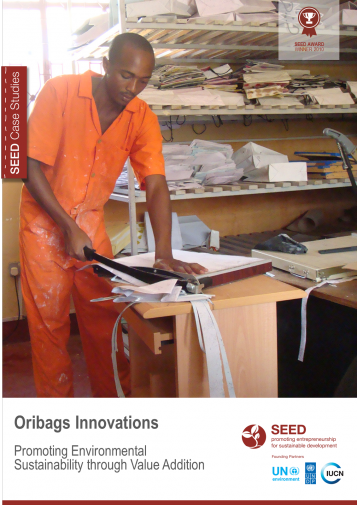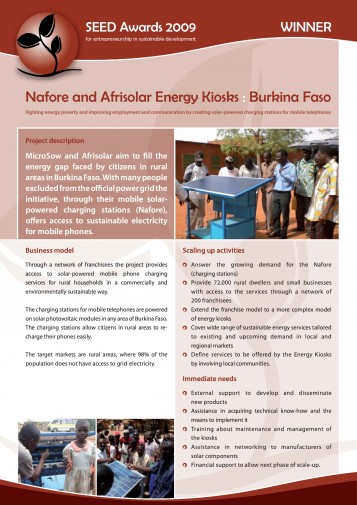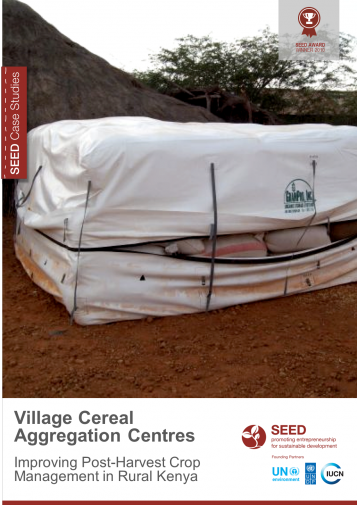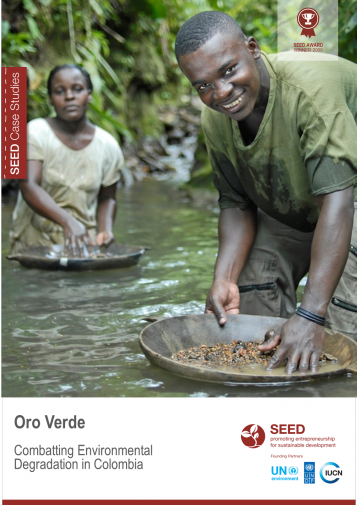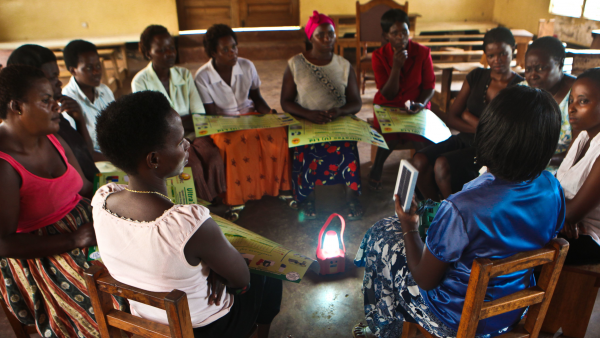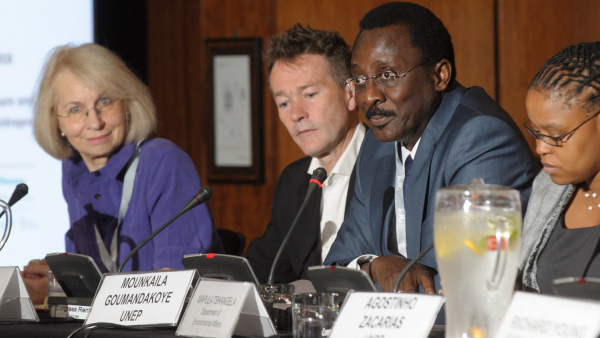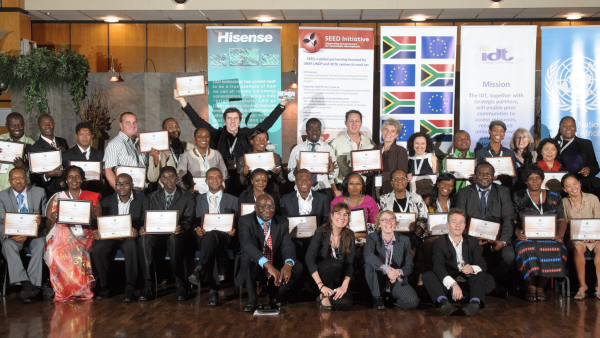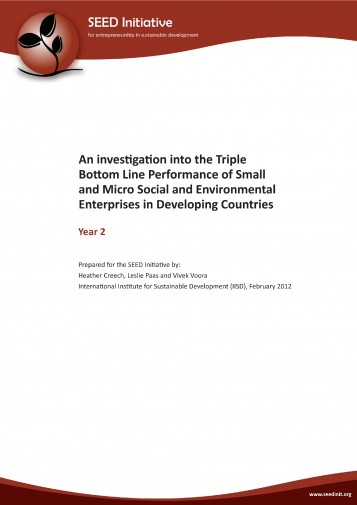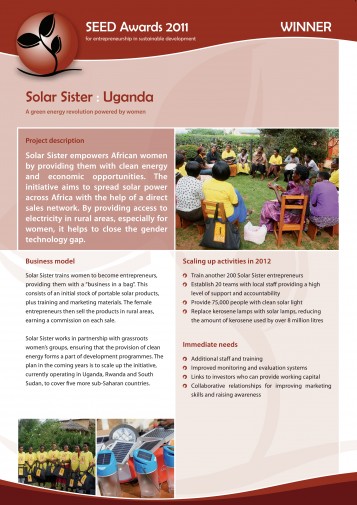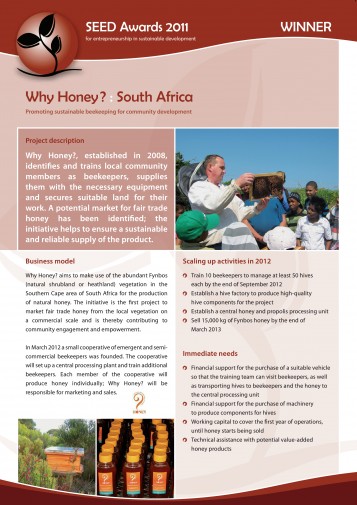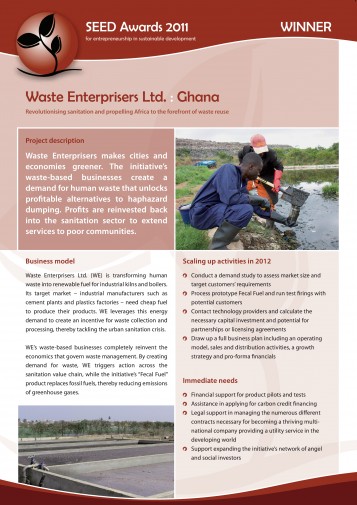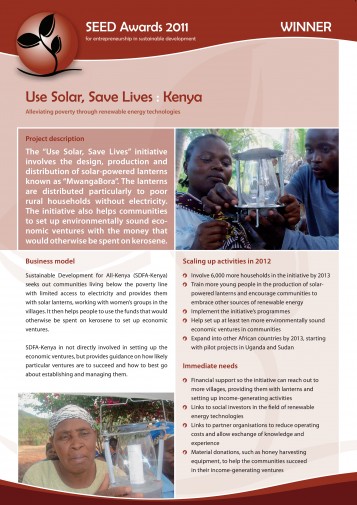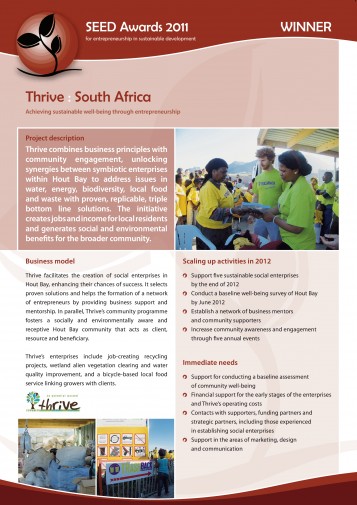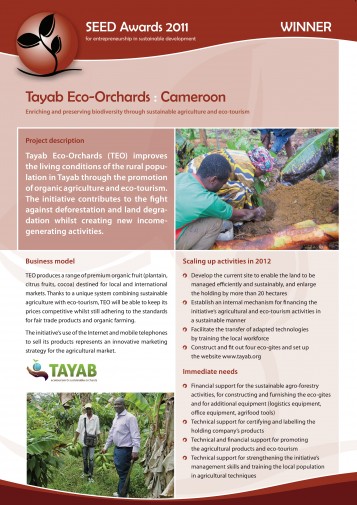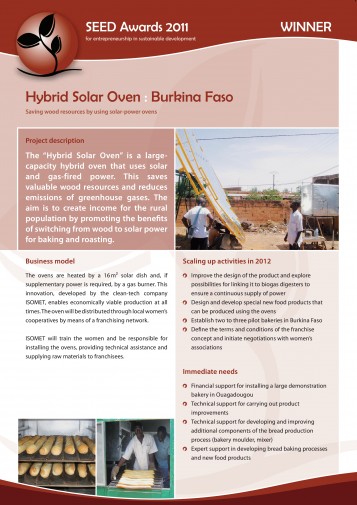Enterprise Brief: Pollinate Energy
Published: 30 August 2013
Pollinate Energy trains local community members to become micro-entrepreneurs and helps them build clean energy businesses. Entrepreneurs are provided with small-scale solar systems and other clean energy products, which they sell to slum residents who would otherwise rely on kerosene. Read more
SDGs:









Enterprise Brief: KARIBU Solar Power
Published: 30 August 2013
KARIBU Solar Power aims to launch a new modular solar lamp via a franchising network. Users pay in small increments, which replicate the required cash flow for kerosene. In this way KARIBU makes high-quality solar lighting and mobile phone charging affordable for low-income communities. Read more
SDGs:







SEED South Africa, a partnership between SEED and the Independent Development Trust (IDT) South Africa
Published: 05 March 2013
Progress is being made towards the promotion of social and environmental entrepreneurship within South Africa. Read more
SDGs:



Longitudinal Study of Eco-Inclusive Enterprise Performance (Part I)
Published: 12 September 2012 Heather Creech, Leslie Paas, Vivek Voora
This report draws insights from a three-year longitudinal study of the performance of social and environmental micro enterprises and tackles two important questions. Firstly, whether and how micro and small social and environmental enterprises make contributions to social, environmental and economic progress within their communities; and secondly, what the enabling factors and barriers towards making such contributions are. Read more
SDGs:

Case Study: Pintadas Solar
Published: 07 September 2012
Pintadas Solar creates sustainable and replicable models geared towards improving livelihoods and climate resilience in areas where agriculture and pasture is the main economic activity. Read more
SDGs:









Case Study: Blue Ventures
Published: 07 September 2012
“Madagascar’s first community-run marine protected area” is a partnership between local people, research institutes, NGOs and a commercial fishing company and focuses on marine conservation and sustainable livelihoods along the southwest coast of Madagascar. Read more
SDGs:









Case Study: Rural Enterprise Network
Published: 07 September 2012
The “Rural Enterprise Network” (REN) is a social marketing organisation that aims to link small-scale farmers in Sri Lanka to input-output markets through improved product quality, access to market information and the establishment of a common brand. Read more
SDGs:







Case Study: SolSource
Published: 07 September 2012
SolSource provides a line of solar concentrators that address three of the four major barriers to solar-powered cooking in rural China. Read more
SDGs:









Case Study: Oribags Innovations
Published: 07 September 2012
Oribags Innovations (U) Ltd is a Ugandan private enterprise which makes hand-made paper bags, printing paper and jewellery from agricultural wastes. Read more
SDGs:









Case Study: Nafore and Afrisolar Energy Kiosks
Published: 07 September 2012
The Nafore and AfriSolar Energy Kiosks were created to address rural electrification challenges in Burkina Faso. Read more
SDGs:







Case Study: Village Cereal Aggregation Centres
Published: 07 September 2012
This initiative enables farmers to deliver high-quality grain to the market value chain, reduce post-harvest losses, and encourage more participation of youth in cereal production. Read more
SDGs:







Case Study: Oro Verde
Published: 07 September 2012
Oro Verde reverses environmental degradation caused by uncontrolled mining in Colombia’s Chocó Bioregion by developing certified responsible mining practices. Read more
SDGs:











2011 SEED Gender and Equality Award winner recognised at the Rio+20 UN Women's side event
Published: 14 June 2012
Three of the 2011 SEED Winners will be showcasing their initiative as examples of innovative women-led enterprises. Read more
SDGs:













Achim Steiner celebrates the 2011 SEED Winners
Published: 18 April 2012
Achim Steiner, UN Under-Secretary General and UNEP Executive Director recognised the value of SEED winners in the Green Economy at the 2012 SEED Symposium and International Award Ceremony, 29 March 2012, Pretoria, South Africa. Read more
SDGs:











2012 SEED Symposium: The Green Economy in Africa: Climate Change and Energy, Agriculture and Food Security, and the Role of Grassroots Entrepreneurs
Published: 29 March 2012
On 29th March, SEED hosted a high-level symposium on the Green Economy in Pretoria, South Africa. Read more
SDGs:









Announcement: Meet the 2011 SEED Winners!
Published: 15 December 2011
It is with great pleasure and excitement that the SEED Initiative today announces the 2011 SEED Award Winners! Read more
SDGs:













2009-2011 Study of Eco-Inclusive Enterprise Performance (Year 2)
Published: 12 September 2011 Heather Creech, Leslie Paas, Vivek Voora
This report draws insights from a three-year study of the performance of social and environmental micro enterprises and tackles two important questions. Firstly, whether and how micro and small social and environmental enterprises make contributions to social, environmental and economic progress within their communities; and secondly, what the enabling factors and barriers towards making such contributions are. Read more
SDGs:

Enterprise Brief: Solar Sister
Published: 30 August 2011
Solar Sister empowers African women by providing them with clean energy and economic opportunities. The initiative aims to spread solar power across Africa with the help of a direct sales network. By providing access to electricity in rural areas, especially for women, it helps to close the gender technology gap. Read more
SDGs:











Enterprise Brief: Why Honey
Published: 30 August 2011
Why Honey?, established in 2008, identifies and trains local community members as beekeepers, supplies them with the necessary equipment and secures suitable land for their work. A potential market for fair trade honey has been identified; the initiative helps to ensure a sustainable and reliable supply of the product. Read more
SDGs:









Enterprise Brief: Waste Enterprisers
Published: 30 August 2011
Waste Enterprisers makes cities and economies greener. The initiative’s waste-based businesses create a demand for human waste that unlocks profitable alternatives to haphazard dumping. Profits are reinvested back into the sanitation sector to extend services to poor communities. Read more
SDGs:







Enterprise Brief: Sustainable Development For All
Published: 30 August 2011
The “Use Solar, Save Lives” initiative involves the design, production and distribution of solar-powered lanterns known as “MwangaBora”. The lanterns are distributed particularly to poor rural households without electricity. The initiative also helps communities to set up environmentally sound economic ventures with the money that would otherwise be spent on kerosene. Read more
SDGs:









Enterprise Brief: Thrive
Published: 30 August 2011
Thrive combines business principles with community engagement, unlocking synergies between symbiotic enterprises within Hout Bay to address issues in water, energy, biodiversity, local food, and waste with proven, replicable, triple bottom line solutions. The initiative creates jobs and income for local residents and generates social and environmental benefits for the broader community. Read more
SDGs:









Enterprise Brief: AGRIPO
Published: 30 August 2011
Tayab Eco-Orchards (TEO) improves the living conditions of the rural population in Tayab through the promotion of organic agriculture and eco-tourism. The initiative contributes to the fight against deforestation and land degradation whilst creating new income generating activities. Read more
SDGs:





Enterprise Brief: Women Environment Preservation Committee (WEPCO)
Published: 30 August 2011
The initiative seeks to enhance environmental conservation while generating income from recycled household waste, mainly in Kathmandu Valley. Women are provided with business and waste management training and access to micro-credit loans, and are encouraged to form conservation groups across the country. Read more
SDGs:







Enterprise Brief: ISOMET Sarl
Published: 30 August 2011
The “Hybrid Solar Oven” is a large capacity hybrid oven that uses solar and gas-fired power. This saves valuable wood resources and reduces emissions of greenhouse gases. The aim is to create income for the rural population by promoting the benefits of switching from wood to solar power for baking and roasting. Read more
SDGs:










